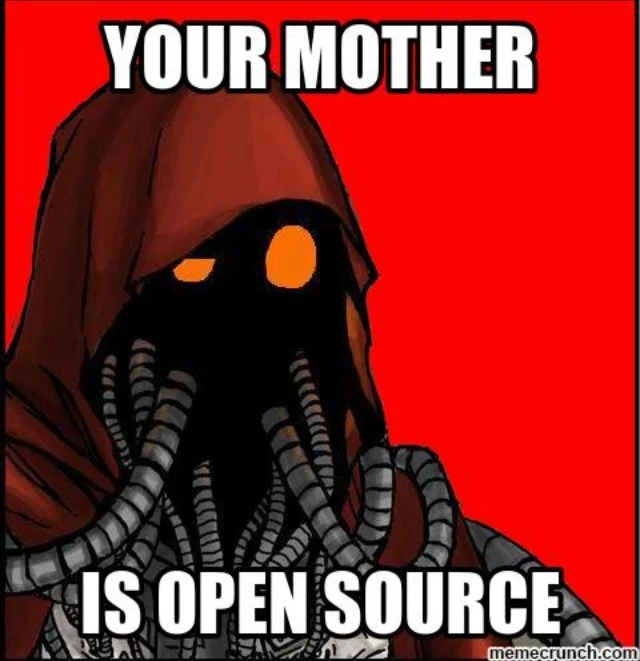And no, I’m not talking about pirating on the internet, I’m talking about getting your internet connection to the outside world without paying or having a subscription or license. Something like a mesh network with your neighbors with the exit node being one person’s high-speed fiber line, or even an exit node through a free public wifi network that you’ve hidden a little repeater device within range of… something like that could be interesting. I’ve been thinking lately of a world where decentralized networks become more common, and where people can freely use the internet without paying an ISP. What are your thoughts?
Many many years ago in the paleolithic era when 2.4GHz was king, a neighbor in the next unit over had an unsecured wifi network… I connected my old laptop, figured out where the connection was best (turned out to be beside the stove in the kitchen?), piped the connection out the ethernet port and into the WAN port on my router, and set up my own “secured” network lol. I’m fairly certain anyone with a straight-up unsecured wifi network doesn’t have the skills or knowledge to detect someone leaching their bandwidth. I did that for like 3 years without a single hiccup until I moved and finally had to start paying.
Ah, yes, the WEP key passphrase era. I was a student then, and you could find me on the roof trying to get a stable signal to inject and capture data packets. Otherwise, no internet for me.
Or he believes in sharing his internet like the Freifunk People do.
Not everyone who is sharing something for free with you is a moron you’re taking advantage of. Pretty disgusting worldview
They said “pretty sure”, not certain. Statistically, they were right, until routers started shipping with “secured” wifi settings by default. Nowadays, its the reverse.
So, this was more common when WEP encryption was used. You could just listen to the radio traffic of the given network and collect IVs which the encryption would leak. Once you had enough pieces you could reassemble the key and access the network. When WPA came out it was harder, but tools like pyrit and john the ripper helped, so long as you were able to capture the 4-way TCP handshake.
To actually see the networks, you would build biquad parabolic antennas from old DirecTV dishes people left behind. They were very directional high gain antennas that you would just target at someone’s house. We’d also build cantennas from junk laying around. Those were interesting days.
lol I did that for a while when I was broke… for quite some time I rigged up my linksys router with wrt, set it up as a repeater for my neighbors wifi after cracking it.
Of course the real irony was after cracking it, I realized I could have cracked it much easier with a phone book (after realizing my local ISP, just used the persons phone number as the WEP key)
Back in the WEP/WPS days it was easy enough to use aircrack-ng and get access to a network. Anything public is likely to be slow and probably no access to open ports or manage it in any way.
I’m paying ~$45 CAD/month for a symmetrical 500Mbps line and I think its worth it. I’d never share this with anyone I don’t know because my name is on it, anything anyone does will come back to me.
I’d never share this with anyone I don’t know because my name is on it, anything anyone does will come back to me.
I’m the opposite. I keep no password on my wifi so I have plausible deniability
Just as s comment for someone else reading this: if this actually has a chance to protect you is highly dependant on your local laws. Even then, at least from my understanding, any lawsuit has to progress relatively far (involving lawyers to a significant degree) for this to become potentially relevant.
It would probably be safer legally to have a long range wifi and let users sign up for free, after agreeing to obey the laws. And then some kind of no-log or worthless-log policy.
Here that doesn’t change or help in any way. You’re the one on the contract for the Internet access, so you’re responsible. That’s it.
You can operate as an ISP, but the requirements and responsibilities that go with that make this a non-starter. From my (limited) understanding, it includes that if you can’t provide the identity of someone who is being sued (including piracy, but also any other law breaking), you’re responsible.
I used to crack my neighbour’s WEP secured Wifi back in the day.
There is freifunk in Germany they use Mesh Network -> Router > VPN to another Country so they dont get Problems by People pirating.
A Freifunk map: https://www.freifunk-karte.de/
Wo kann ich da mehr drüber lernen? :3
Wait but the mesh network is virtual they don’t have their own antennas right?
They have their own antennas. If the internet connection of one router dies, but it has a connection to another Freifunk node, it gets routed over the other one.
That’s super cool, that sounds apocalypse-ready. It probably only exists in cities though, right?
It isn’t just deployed by nerds but sometimes also by cafes, libraries and municipalities. So you can expect them to be in every town but they don’t have such a dense coverage that they have a full mesh network over a city.
And the thing that is missing is that there are no inter network services like an copy of Wikipedia, LLMs or fileshares.






